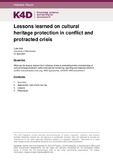| dc.contributor.author | Kelly, Luke | |
| dc.date.accessioned | 2021-05-04T11:58:57Z | |
| dc.date.available | 2021-05-04T11:58:57Z | |
| dc.date.issued | 2021-04-27 | |
| dc.identifier.citation | Kelly, L. (2021). Lessons learned on cultural heritage protection in conflict and protracted crisis. K4D Helpdesk Report. Institute of Development Studies. DOI: 10.19088/K4D.2021.068 | en |
| dc.identifier.uri | https://opendocs.ids.ac.uk/opendocs/handle/20.500.12413/16576 | |
| dc.description.abstract | This rapid review examines evidence on the lessons learned from initiatives aimed at embedding better understanding of cultural heritage protection within international monitoring, reporting and response efforts in conflict and protracted crisis. The report uses the terms cultural property and cultural heritage interchangeably. Since the signing of the Hague Treaty in 1954, there has bee a shift from 'cultural property' to 'cultural heritage'. Culture is seen less as 'property' and more in terms of 'ways of life'. However, in much of the literature and for the purposes of this review, cultural property and cultural heritage are used interchangeably. Tangible and intangible cultural heritage incorporates many things, from buildings of globally recognised aesthetic and historic value to places or practices important to a particular community or group. Heritage protection can be supported through a number of frameworks international humanitarian law, human rights law, and peacebuilding, in addition to being supported through networks of the cultural and heritage professions. The report briefly outlines some of the main international legal instruments and approaches involved in cultural heritage protection in section 2. Cultural heritage protection is carried out by national cultural heritage professionals, international bodies and non-governmental organisations (NGOs) as well as citizens. States and intergovernmental organisations may support cultural heritage protection, either bilaterally or by supporting international organisations. The armed forces may also include the protection of cultural heritage in some operations in line with their obligations under international law. In the third section, this report outlines broad lessons on the institutional capacity and politics underpinning cultural protection work (e.g. the strength of legal protections; institutional mandates; production and deployment of knowledge; networks of interested parties); the different approaches were taken; the efficacy of different approaches; and the interface between international and local approaches to heritage protection. | en |
| dc.description.sponsorship | FCDO (Foreign, Commonwealth and Development Office) | en |
| dc.language.iso | en | en |
| dc.publisher | Institute of Development Studies | en |
| dc.relation.ispartofseries | K4D Helpdesk Report;997 | |
| dc.rights.uri | https://www.nationalarchives.gov.uk/doc/open-government-licence/version/3/ | en |
| dc.subject | Science and Society | en |
| dc.subject | Security and Conflict | en |
| dc.title | Lessons Learned on Cultural Heritage Protection in Conflict and Protracted Crisis | en |
| dc.type | Helpdesk | en |
| dc.rights.holder | © Crown copyright 2021 | en |
| dc.identifier.doi | 10.19088/K4D.2021.068 | |
| dcterms.dateAccepted | 2021-04-27 | |
| rioxxterms.funder | Default funder | en |
| rioxxterms.identifier.project | Default project | en |
| rioxxterms.version | VoR | en |
| rioxxterms.versionofrecord | 10.19088/K4D.2021.068 | en |
| rioxxterms.funder.project | 9ce4e4dc-26e9-4d78-96e9-15e4dcac0642 | en |

